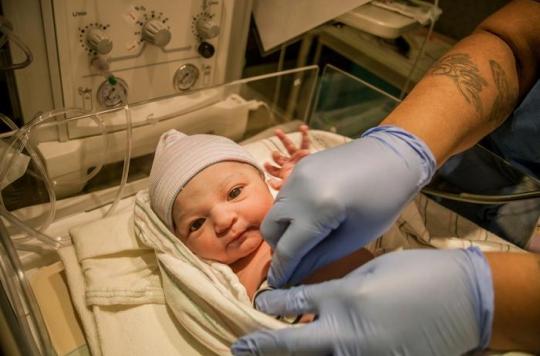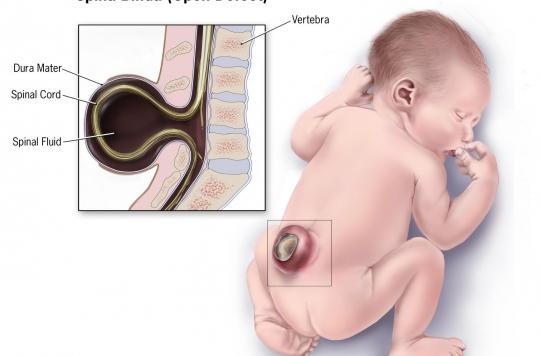A 22-year-old American saved her baby’s life by allowing doctors to perform a laparotomy, an extremely rare operation performed before term. Explanations.

At the end of the 19th week, Joni Reinkemeyer, a young American of 22, learns that her baby has spina bifida, a malformation of the fetus that develops during the first months of pregnancy. More specifically, it is a defect in the closure of the rear part of one or more vertebrae, leaving bare and unprotected the contents of the spine (meninges, spinal cord, nerve roots, etc.). The consequences of this malformation are multiple: hydrocephalus (and associated cognitive disorders or mental retardation), muscle paralysis, urinary and fecal incontinence, sexual disorders or even malformation and deformation of the limbs.

There is only one solution to save the baby: to perform a laparotomy, an extremely rare operation which consists of “exteriorizing” the uterus by raising it slightly and opening it very partially to access the fetus with the endoscope and the instruments necessary for it. repair of the malformation. The fetus remains permanently in the amniotic cavity, which surgeons access through a small opening in the uterus of a few centimeters. A heavy intervention, which mobilized a team of 32 people, but the outcome of which was successful:he little Jackson was born 10 weeks later and is doing well.
A laparotomy successfully performed in France
In 2014, teams from Trousseau Hospital and Necker Hospital also operated on a fetus five months before birth. “The uterus must be soft like a sock, explained at the time the gyneco-obstetrician Jean-Marie Jouannic, who led the maneuver. The mother is administered drugs against contractions and anesthetic drugs which also act on the fetus”. In this way, the doctors had access to the baby’s back where the defect was located. “The surgeon covers the spinal cord by welding the envelope which normally covers it. Then he sutures the skin of the fetus,” he explained.
Usually, the operation is performed a few days after the baby is born, but studies have shown that prenatal surgery reduces the risk of developing motor and intellectual disabilities, especially because repairing this defect stops the leak. cerebrospinal fluid. To be able to operate, Jean-Marie Jouannic had trained on fetuses of lambs for several years.
Performed in a dozen hospitals around the world, this delicate operation seems to give encouraging results, despite the risks it entails. In the days following the operation, the mother can give birth at any time, thus negating the benefits of the operation and putting her baby’s life at risk.
In 80% of cases, doctors offer an abortion
Some babies are affected by “spina bifida occulta” or “closed”: the vertebral arches are poorly welded but the marrow remains protected by the spine and by the skin, unlike “open” spina bifida (“spina bifida aperta”) which leaves bare nervous material. Spina bifida can be detected in the sixth month of pregnancy. In 80% of cases, doctors offer an abortion.
If the parents refuse it, “these disorders must be managed from birth, otherwise they lead to a rapid deterioration of the urinary system (bladder and kidney)”, explains Xavier Gamé, urologist at Rangueil hospital in Toulouse, member of the AFU Neuro-urology Committee and AFU Secretary General.
Repeated infections may indeed lead to pyelonephritis, which itself causes impaired kidney function. In the long term, for lack of a well-conducted preventive treatment, the baby becomes renal insufficiency at an early stage and may end up waiting for a transplant from the age of 20 years. Stones (urolithiasis) can also disrupt daily life. On the side of the bladder, the mucous membrane, subject to a permanent inflammatory state, is also at risk of becoming cancerous (urothelial carcinomas, squamous cell carcinomas, etc.).
Each year in Europe, nearly 5,000 pregnancies are affected by neural tube closure abnormalities.
.

















